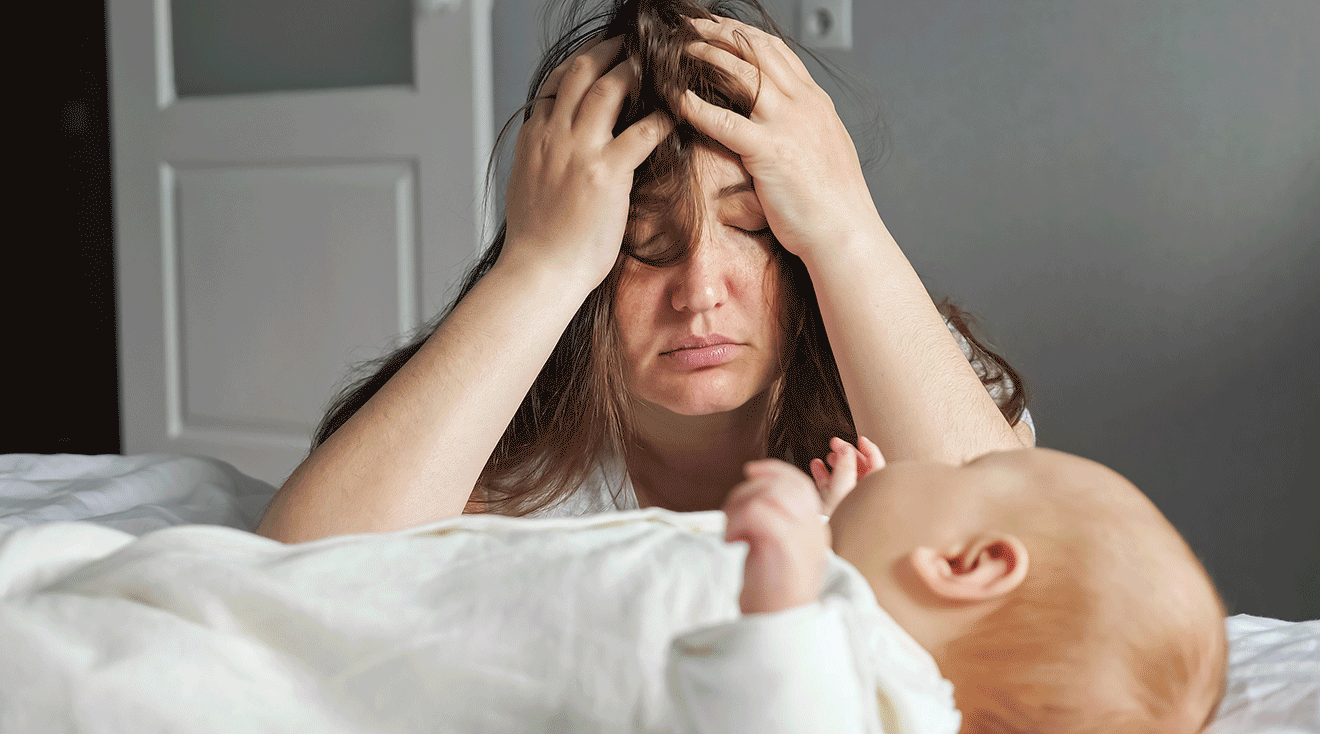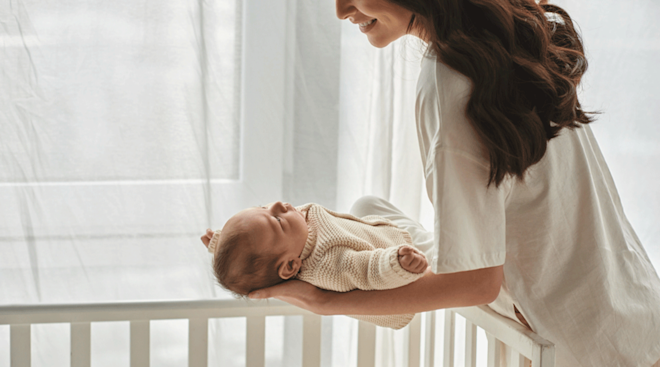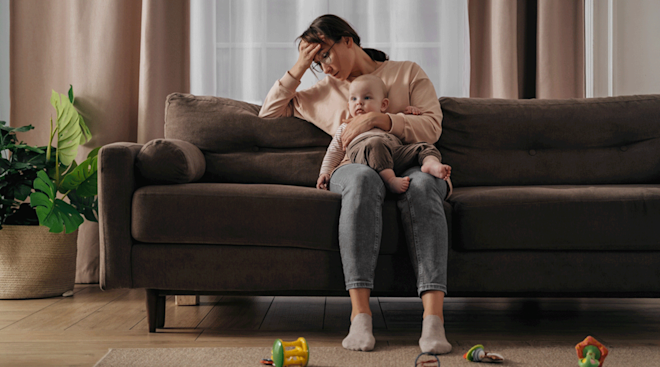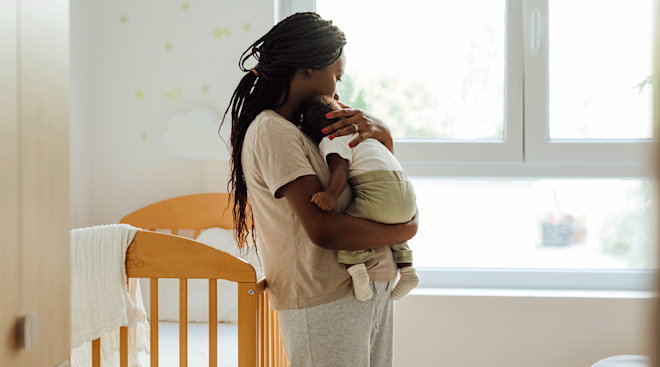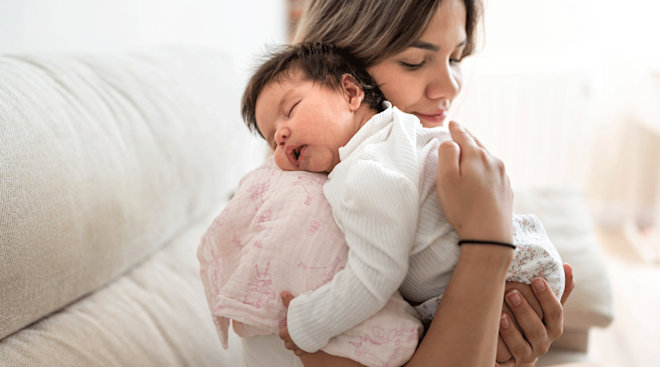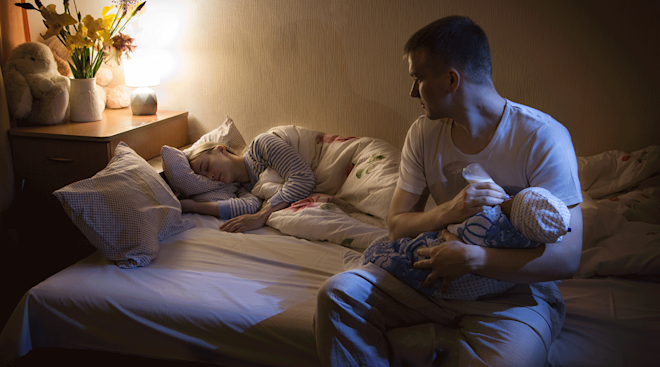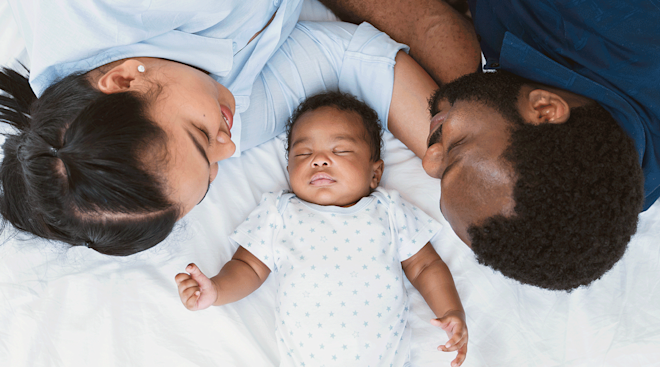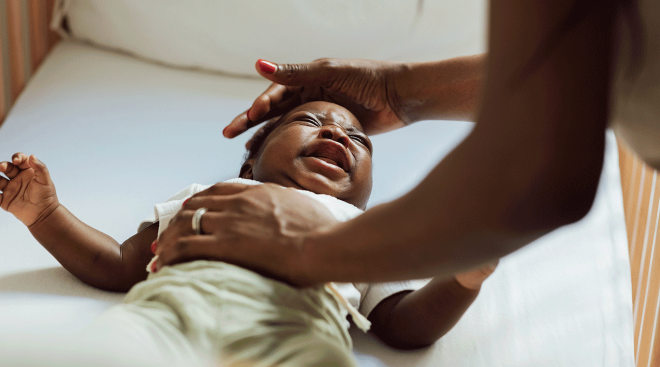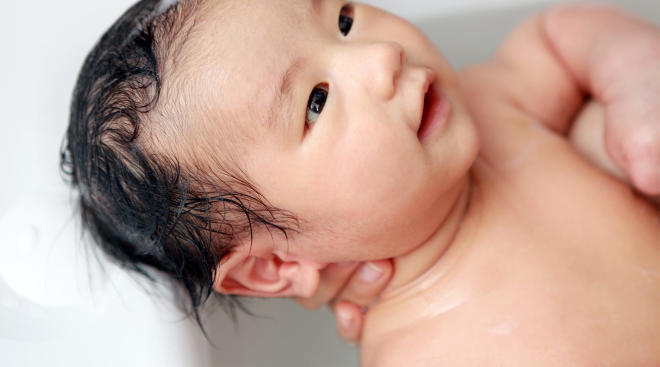How to Survive Sleep Deprivation as a New Parent
Sleep deprivation is one reality of new parenthood we could all do without. It’s a cruel irony that when babies are at their most vulnerable, their parents are the most impaired due to lack of sleep. (I, for one, would like a word with the manager!) My daughter’s first year was especially challenging sleep-wise. She’s what Macall Gordon, MA, a pediatric sleep consultant, temperament expert and researcher, would call a “livewire”—big feelings, lots of energy and seemingly hates sleep. At 9 months old, when babies are supposed to mostly be sleeping through the night, she was still waking up every single hour. Did I hallucinate that our baby monitor was talking to me once? Yes. Yes, I did. Thankfully, we got help and made it through. (And you can, too!) Ahead, what you can expect during those early sleepless months—and how to survive.
The first year of parenthood will look different for everyone. However, due to the nutritional needs of newborns, sleep deprivation in the first few months is essentially guaranteed. “In those early days, newborns typically have irregular sleep patterns, often sleeping for short periods and then waking to feed,” explains Natalie Barnett, PhD, pediatric sleep researcher and vice president of clinical research at Nanit. “Parents can expect to experience significant sleep deprivation during this period as they adjust to the demands of caring for a newborn around the clock.”
Another thing that makes newborn sleep challenging is that they can’t tell the difference between day and night right away. “Somewhere around 6 to 8 weeks, babies start to produce melatonin, the hormone that helps them develop their circadian rhythm,” Barnett says. “Parents can help facilitate this process by exposing baby to natural light, engaging in stimulating activities during the day and then keeping nighttime interactions calm in a dimly lit setting.”
Monica Wonnacott, MD, a pediatrician in the Salt Lake City area and founder of Pediatric Answers, an online resource for parents, breaks down the first year further. “By 2 months, most infants can sleep a four-hour stretch at night. By 4 months, most will sleep five-to-six-hour stretches,” she explains. “By 6 months, an infant can be expected to ‘sleep through the night,’ which, by definition, is an eight-hour stretch. It isn’t until you get to 9 months that babies will give you those glorious nine-to-12-hour nights.” Keep in mind that these are averages from which some babies, like my own, deviate wildly. Barnett confirms: “There’s huge variability in how much a baby sleeps and what’s normal.” Lauren Hays, PMHNP, a psychiatric nurse practitioner and co-founder of The Matrescence, an app and private community offering postpartum education for moms, reminds us that “teething, growth spurts and learning new skills can disrupt this process.”
So you’ve got a cute, but sleep-resistant baby at home? I’ve been there. And, in the moment, it can feel borderline torturous. It’s going to take time, but we promise you will sleep again. In the meantime, here are some strategies to help you cope with the utter exhaustion that accompanies new parenthood.
Give yourself grace
You’re caring for a brand-new human baby while running on fumes. You’re already a superhero. Be gentle with yourself during this difficult time. “With time, every parent finds a rhythm that works for their unique situation—and sleep will once again become an attainable luxury,” says Hays. Remember: If a sleep routine is working for you and your family, it’s working. And if it’s not, another strategy just might.
Rest when you can
While the age-old advice to sleep while baby sleeps isn’t always possible due to other caretaking responsibilities, work-related demands and conditions like postpartum anxiety, it’s helpful to at least rest whenever you can. Allison C., mom of two girls, ages 3 and 5, reflects on her fourth-trimester rest plan: “Every night for a two-to-three-hour stretch, my night-owl husband would care for our baby outside of our bedroom so I could start the night with a chunk of uninterrupted sleep.” Similarly, you can schedule shifts for you and your partner. If you’re breastfeeding, you could try to pump so that your other half can take a middle-of-the-night feeding.
Make room for your brain fog
“Sleep deprivation can impair cognitive function, including memory, concentration and decision-making abilities,” says Barnett. “This can make it difficult for parents to perform daily tasks effectively and safely, and also impacts productivity at work.” Accommodate your brain fog by setting up your house in helpful ways. Our family, for example, keeps notepads and pens in every room of our house so we can write down to-do tasks or important thoughts before forgetting them.
Move during the day
It might sound like the last thing you want to do, but moving more during the day can help improve the quality of what little sleep you’re getting at night, says Courtney Morgan, LPCC, a therapist in the Louisville, Kentucky, area and the founder of Counseling Unconditionally. “This doesn’t need to be strenuous in order to be effective,” she says. “Going on a walk and pushing baby in their stroller may be enough to feel the benefits.”
Limit your time online
In a sea of contradictory advice, it’s easy to go down rabbit holes and start second-guessing your every parenting move. “I talk to brand-new parents every day who are already worried that they’re ‘blowing it’ with sleep,” Gordon says. Protect yourself from undue stress by creating boundaries for your time and activity online. If you have a concern, contact a specialist.
Create a nighttime relaxation ritual
After many nights of interrupted sleep, parents can start to feel anticipatory anxiety as evenings approach. To ease this anxiety, Hays recommends starting the evening with grounding techniques like deep breathing or meditation. She says by doing so, “we can remind our body and mind that we’re safe and calm the hyped-up nervous system.” As part of keeping up with your “sleep hygiene,” Hays also recommends limiting your screen time before bed and making sure the temperature in your room is comfortable.
Seek professional support
New parenthood is a taxing time. Whether you need support with your mental health or baby’s sleep, getting the right professional help can make a world of difference. Morgan says: “Professionals that specialize in this area will have the skills to support you during this time.”
Outsource care tasks when possible
If possible, enlist your friends and loved ones to help with things like cooking, cleaning, caring for baby and household tasks. “If you’re lucky enough to have people around you offering support, consider taking them up on their offerings,” says Morgan. And if no one offers, ask. If this feels hard, Hays reminds us, “You’re in a season of receiving support. At some point, you’ll be able to offer support back to those around you.”
Make sure to meet your basic nutritional needs
Make sure you’re eating enough calories and drinking plenty of water throughout the day. “Proper nutrition and hydration combat fatigue,” Hays says. “Blood sugar plummets and spikes can affect your mental and physical health, and can wreak havoc on your energy reserves.”
Keep up with your interests from before baby
Staying engaged in a hobby or interest from your life before baby can help you feel more like yourself and cope with the challenges of new parenthood. “Have your non-negotiable and keep it after baby comes—something you did before that helps you relieve stress,” says Aziz C., dad of two girls, ages 3 and 5. For him, that means playing guitar and soccer, but it can be as simple as watching a favorite TV show.
Avoid driving when running on fumes
Stay off the road when particularly sleep-deprived, especially after getting less than five hours of sleep the night before. Barnett shares, “Recent research out of Australia showed that moms with babies who don’t sleep well drive as poorly as people with blood alcohol levels that exceed legal limits.”
Frequently Asked Questions
How does sleep deprivation affect your physical health?
Sleep deprivation, even in the short term, can negatively affect physical health. “Lack of sleep can weaken the immune system, making parents more susceptible to illnesses such as colds and flu,” Barnett says. “Fatigue resulting from sleep deprivation can increase the risk of accidents and injuries, both at home, in the workplace and on the road.”
How does sleep deprivation affect your mental health?
Sleep deprivation can negatively affect mental health as well. “In the short term, lack of sleep can contribute to feelings of irritability, mood swings, and depression or anxiety,” Barnett says. “This often strains relationships with partners and children, and makes it more challenging to cope with the demands of parenting.”
Can sleep deprivation cause postpartum depression?
In short, not exactly. “Postpartum depression is multifactorial, so we can’t say that sleep deprivation itself is the cause,” says Hays. “[But] we can confidently say that sleep deprivation is one of the biggest factors in the development of postpartum depression and a catalyst for severity.”
Please note: The Bump and the materials and information it contains are not intended to, and do not constitute, medical or other health advice or diagnosis and should not be used as such. You should always consult with a qualified physician or health professional about your specific circumstances.
Plus, more from The Bump:
Natalie Barnett, PhD, is a pediatric sleep researcher and the vice president of clinical research at Nanit. She has a PhD in genetics from the University of New England in Australia and a postgraduate certificate in pediatric sleep science from the University of Western Australia.
Macall Gordon, MA, is a pediatric sleep consultant, temperament expert, researcher and author with over 16 years of experience in advocating for and supporting parents of fussy, spirited and alert children (she calls them "livewires"). She has a master's degree in Applied Psychology from Antioch University Seattle and a BS in Human Biology from Stanford University. She’s a certified "gentle" sleep coach using alternatives to the cry-it-out method.
Lauren Hays, PMHNP, is a psychiatric nurse practitioner and co-founder of The Matrescence, an app and private community offering postpartum education for moms.
Courtney Morgan, LPCC, is a therapist in the Louisville, Kentucky, area and the founder of Counseling Unconditionally.
Monica Wonnacott, MD, is a pediatrician in the Salt Lake City area and founder of Pediatric Answers, an online resource for parents. She received her medical degree from St. George’s University School of Medicine.
Transportation Research Part F: Traffic Psychology and Behaviour, Are New Mums Driving Tired?, July 2023
Learn how we ensure the accuracy of our content through our editorial and medical review process.
Navigate forward to interact with the calendar and select a date. Press the question mark key to get the keyboard shortcuts for changing dates.
































